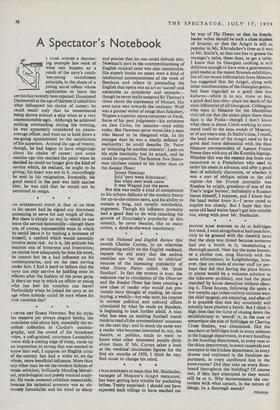I NEVER MET Ernest Newman. But his style, his massive
yet always elegant books, the Anecdotes told about him, especially the ex- cellent collection in Cardus's autobio- graphy, and the sound of his broadcast voice, a soft-grained, courteous Lancashire voice with a cutting edge of irony, made up an impression so strong that one seemed to know him well. I suppose no English critic of the century has had a wider or, on the whole, more beneficial influence. More than any other man he set the modern fashion of music criticism, brilliantly blending histori- cal, psychological and purely musical analy- sis. He made personal criticism respectable, because his technical armoury was so ob- viously formidable and his mind so sharp and precise that no one could debunk him. Newman's part in the cosmopolitanising of English musical taste was also inestimable. His superb books on opera wore a kind of intellectual accompaniment of the work of Beecham and others in persuading the English that opera was an art as 'sacred' and admirable as symphony and oratorio— though he never really accepted Sir Thomas's views about the supremacy of Mozart. His own taste was towards the intricate: Wolf was a greater writer of songs than Schubert, Wagner a superior opera composer to Verdi. Some of his past judgments—his strictures on Don Carlos, for instance—read oddly today. But Newman never wrote like a man who feared to be disagreed with. In his younger days he was a deadly deflator of mediocrity; he could describe Dr. Parry as 'sickening for another oratorio'. Later on his style inevitably lost its attack, and he could be repetitive. The famous New States- man clerihew related to his latter days on the Sunday Times:
Ernest Newman Said 'next week Schumann', But when next week came It was Wagner just the same.
But this was really a kind of compliment to his urbane defiance of the modern frenzy for up-to-the-minute news, and his ability to sustain a long, and usually worthwhile, argument. Though his influence probably had a good deal to do with retarding the growth of Stravinsky's popularity in this country, he never became, like so many critics, a dyed-in-the-wool reactionary.






































 Previous page
Previous page